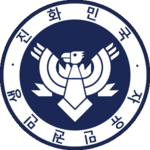Shinzhen Doctrine
Part of a series on the |
|---|
| History of Zhenia |
 |
| Timeline |
The Shinzhen Doctrine (Zhenian: 신진 독트린, 신진 선언), often referred to as the New Zhen Movement or the Shinzhen Declaration, was a Imperial Zhenian policy that actively opposed further Auroran imperialism in Tarsis and areas deemed the 'Zhenian sphere of influence'. With its roots on Shinzhen Thought that stemmed during the Zhenian Civil War, it stated that any further inroads into the "what is the heartland of the Zhenian people and the many peoples of Tarsis as a whole" would be "regarded as the direct manifestation of warmongering disposition towards the Empire of Zhenia", while also calling for a more active role for Zhenia to stop and repel Auroran influence in such areas as well as refuse to diplomatically recognize all Auroran possessions within the area.
The Shinzhen Doctrine was first declared during the speech of Emperor Seongjo, as he commemorated the tenth anniversary of the Empire of Zhenia. Asserting that Tarsis belonged to the people of Tarsis, and what was considered the heartland of Zhenia to the Zhenian people, the doctrine drew a clear line in which foreign influence, particularly Auroran influence, will not be tolerated; such clear line was intended to ease the process in which Zhenian influence can be exerted into Tarsis and the Hanmaric Ocean with less Auroran interference. It had lasting impacts in the foreign policies of the Empire of Zhenia and its successor, the Republic of Zhenia, laying the fundamentals of the "heartland of the Zhenian people". It would continue to be interpreted as the cornerstone of Zhenia's place in the international community, being referred to by numerous succeeding Zhenian leaders, including Emperor Saejo, Amasar Ren and Kim Shimin.
After Zhenia's victory in the First Great War, the Shinzhen Doctrine proliferated to other parts of the colonized world, although it was primarily interpreted in the context of independence from Auroran colonialists and establishing an international organization that was primarily led by the people themselves. Later interpretations in Zhenia, however, expanded the Shinzhen Doctrine to expand the "realm and heartland of the Zhenians", which resulted in the rise of Zhenian militarism in the 1930's and became one of the ideological causes of the Second Great War.

